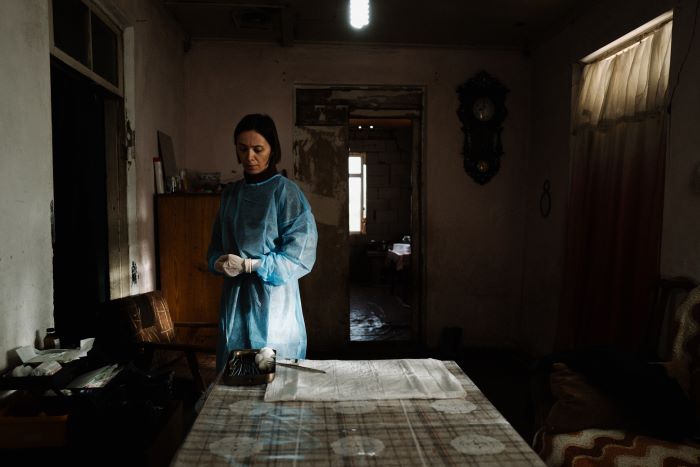Following her debut feature, Beginning, a jarring portrayal of disillusionment, extremism, and rigid patriarchy in a Jehovah’s Witness community in the Republic of Georgia, Dea Kulumbegashvili turns her camera to the similarly difficult issue of women’s bodily autonomy in April. Nina, an OB-GYN, performs unauthorized abortions in a rural area. The film is structured between the ethereal wanderings of an alien-like creature, a plethora of nature shots depicting unnerving tranquility, and the main storyline of legal (with restrictions) and illegal operations.
The tone is realist, brutally portraying the difficulties of life in the countryside. Eastern Orthodoxy pervades the society more than 30 years after the Soviet Union’s collapse. In an interview, Kulumbegashvili states that the issue of abortion feels like a Soviet form of oppression: Abortions are legal but difficult to obtain. She recalls her grandmother educating women in Georgia about birth control, especially after her own mother became pregnant with her at the age of 16. During the casting of Beginning, Kulumbegashvili encountered numerous young women with children and noticed a cycle of young motherhood, along with the lack of basic education being provided to their children. April asks how this cycle can be broken for women who are entrapped and denied a wide range of opportunities.
Much like Kulumbegashvili’s grandmother—and, in a way, the director herself—Nina (played by Ia Sukhitashvili) is driven by idealism as she encounters and treats women, whether during a natural birth, providing contraceptive pill guidance, or performing abortions. Her encounters are told through static and prolonged wide shots, confining Nina in small spaces and intimate moments. Cinematographer Arseni Khachaturan’s camera doesn’t allow the audience to look away from the harrowing experiences of life and death. Every sequence becomes a moment on the edge, with something more difficult to process just around the corner.
Throughout, Nina is consistently accused of dereliction of duty. Sometimes this accusation appears in the polite form of a warning from a colleague or former lover. Sometimes it is a literal literal slap in the face from the husband of a patient whose wife—Nina’s patient—had a stillbirth. Each scene is equally impactful and harsh, regardless of its context. Yet, the camera becomes more humanizing when it focuses on the abstract, aging “monster” that roams and wheezes slowly in a dark, nightmarish setting, or when it occupies Nina’s home. This body could be seen as the voice of Nina’s emotions and struggles. In some ways, it represents how Nina sees herself. However, these metaphorical sections don’t always align seamlessly with the mostly down-to-earth tone, making it difficult to fully invest in an already challenging theme.
Nevertheless, Kulumbegashvili successfully creates a storyline that keeps the audience on edge throughout, told in such a harrowing way that even the prolonged nature sequences offer little relief from the film’s disturbing atmosphere. She brings attention to the question of autonomy by forcing the audience to confront the realities of abortion through extended static shots. A subplot involving a mute patient forced to have an abortion is particularly affecting, pushing to the forefront the horrors that can occur in this traditional rural society.
The result is a remarkable, disturbing film that brings the audience into close emotional proximity with women facing extreme difficulties. While it won’t be easy viewing for most, the intense subject matter is handled with directness and sensitivity by Dea Kulumbegashvili.
Metrograph Pictures will release April in 2025.

















Leave A Comment